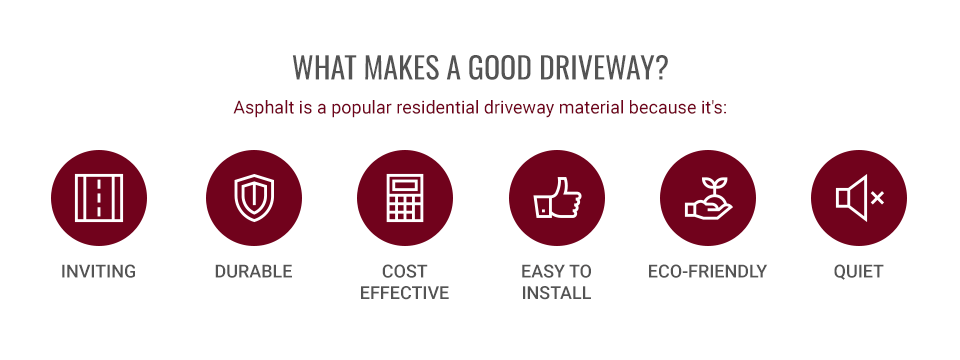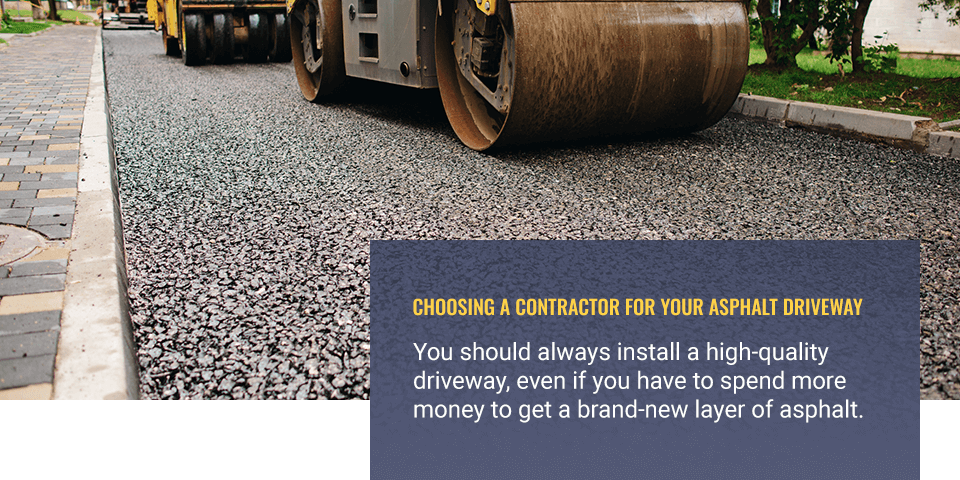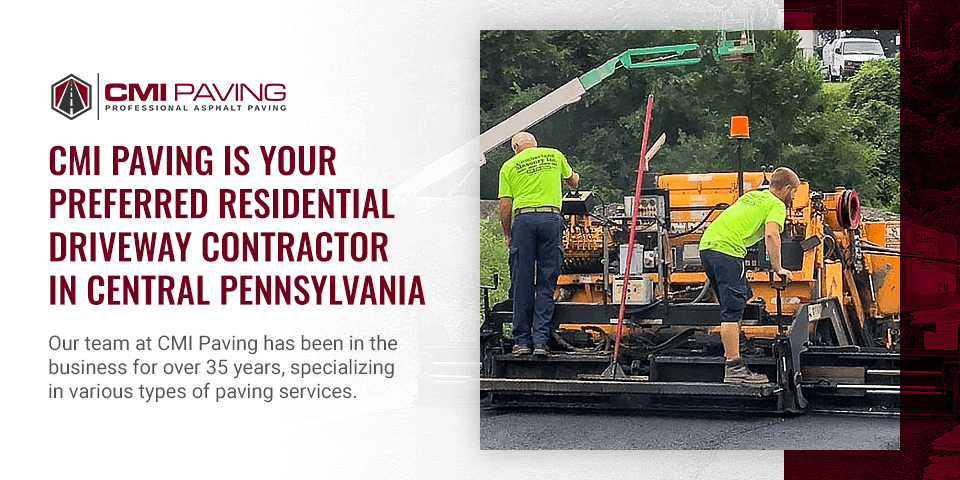Guide to Asphalt Paving Your Driveway
Asphalt is a long-lasting, cost-effective material made from a mixture of sand, stone and petroleum. An asphalt driveway could enhance your home’s curb appeal by adding a clean appearance to your front yard. Before upgrading your residential driveway in Central Pennsylvania, use this guide to help you plan your project.
View More Asphalt Driveway Resources
- Asphalt vs. Concrete Driveway
- Can You Put Asphalt Over Concrete?
- Best Time to Pave Your Driveway in PA
- How Wide Should Your Driveway Be?
- How to Protect Your Driveway During Winter
- How to Tell a Bad Asphalt Driveway Job from a Good One
- Is Salt Bad for Your Driveway?
Factors to Consider When Installing an Asphalt Driveway
Instead of taking on this project yourself, save time and energy by trusting a professional contractor to handle the installation of your asphalt driveway. Before scheduling an estimate, think about these factors as you plan your driveway project:
- Time of year: Install your asphalt driveway in the spring or summer to provide warm enough conditions for hot mix asphalt paving. Colder temperatures cause irregularities in the asphalt, and snow and ice could delay the project.
- Dimensions: While factoring in the cost and placement of your driveway, be sure to also consider the width. Think about how much space you need for your vehicles and how long you want it to stretch into your property.
- Load requirements: Consider how many cars you’ll have in your driveway to figure out the thickness you need. If you have a larger vehicle or you like to host parties and have many people park in the driveway, you should request a higher thickness.
- Drainage: Figure out how to direct water away from your property when it rains. You could have it slope down the driveway into the street, or you could have it flow onto the grass.

What Makes a Good Driveway?
Driveways provide protected space for your vehicles, but they also add value to your house. Asphalt is a popular residential driveway material because it’s:
- Inviting: An attractive driveway enhances your home’s curb appeal and creates a focal point for your property. Asphalt is bold and impressive due to its smooth surface, and it increases your house’s resale value if you plan on selling it soon.
- Durable: Asphalt is extremely flexible, allowing it to move with the natural settlements of the earth. It holds up better than other driveway alternatives in the Pennsylvania climate. Hot mix asphalt is also resistant to thawing and freezing, so you don’t need to salt the driveway in the cold.
- Cost-effective: Asphalt is relatively affordable to install. It also lasts longer than other driveway materials, so you won’t need to repair or replace it as often.
- Easy to install: Installing an asphalt driveway will take a couple of days at most. It hardens by cooling, allowing you to use your asphalt driveway sooner.
- Eco-friendly: The ability of contractors to recycle asphalt provides less work for factories and a healthier environment. When contractors recycle asphalt, it creates a more robust mix for its next use.
- Quiet: Asphalt naturally absorbs noise from the road, providing a better atmosphere at night when you’re trying to sleep.
Factors That Affect Asphalt Driveway Cost
Since asphalt is a durable material, it’s worth the price of installing a brand-new driveway on your property. As you create your budget, here are some of the factors that affect the cost of an asphalt residential driveway:
- Size: The main element that determines the price of your driveway is the square footage. Contractors usually charge per square foot, including the cost of the material and labor.
- Usage: The thickness of the asphalt needed depends on how much you expect from the driveway. You will need to pay more money if you have a heavy truck or multiple vehicles.
- Location: The price of asphalt depends on the local averages based on the region where you live. If fuel prices are generally higher in your town than in the rest of the country, you could expect to pay more for your driveway installation.
- Existing conditions: The type of soil or terrain on your property will determine how much it costs to install your driveway. Your contractor may need to remove your existing driveway or create the proper elevation.

Choosing a Contractor for Your Asphalt Driveway
To install a new residential driveway, you need to find a reliable, trustworthy contractor. Be careful of contractors coming to your door, claiming they have leftover asphalt from a previous customer and can give you a good deal. You should always install a high-quality driveway, even if you have to spend more money to get a brand-new layer of asphalt.
Follow these tips when selecting a contractor:
- Look for a contractor with experience and an established reputation in the community.
- Interview and receive proposals from more than one contractor to compare prices and services.
- Visit local projects by the prospective contractors and interview the owner.
- Make sure you agree on the thickness that you need to accommodate your vehicles.
- Create a written contract or agreement that establishes a professional relationship between you and the contractor.
Asphalt Driveway Installation Timeline
When it’s warm enough outside, your contractor will complete your driveway in about a day or two. You can expect your contractor to follow this timeline:
- Demolition and removal: If you decide not to use the original driveway as part of the base, the contractor will remove it and dispose of it. When replacing an asphalt driveway, you could recycle your old material and save money in installation costs.
- Grading and sloping: Grading the surface allows water to drain away from the pavement to a grassy area. The contractor may need to give the surface a slope to direct water toward the street.
- Creating the base: Sturdy support for your asphalt driveway will help it keep its shape. You could either install paving over the existing driveway, remove the old driveway and pave on the soil or remove the old driveway and pave on an aggregate base.
- Add the binder layer: This layer is a large aggregate mixed with oil, and it goes beneath the asphalt surface. Your contractor will lay out a proof roll to test the strength of this underlying surface and repair any soft areas.
- Apply the asphalt surface: Once the contractor lays down the top layer, they smooth and compact it. After that, your new asphalt driveway needs to cure before you can drive your car on it. Check with your contractor about when it’s safe to use.
CMI Paving Is Your Preferred Residential Driveway Contractor in Central Pennsylvania
If you’re considering an asphalt driveway in Central Pennsylvania, give us a call. Our team at CMI Paving has been in the business for over 35 years, specializing in various types of paving services. Contact us today to schedule an estimate.


